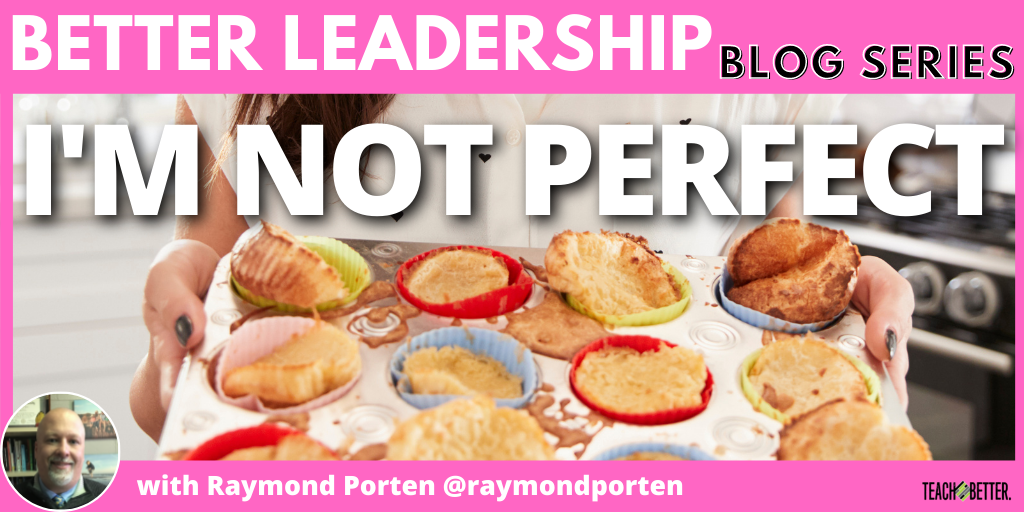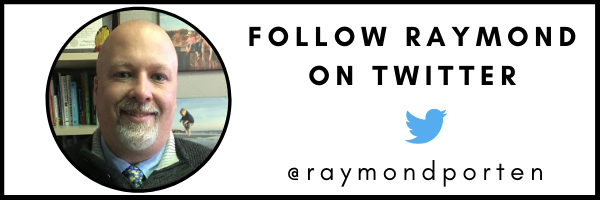TL;DR:
- We have to model what we want to see, and that is that we aren’t perfect.
- Leaders should model imperfections and vulnerability to their staff.
- Mistakes should be seen as learning opportunities or learning experiences.
No One Is Perfect

In my last blog I talked about “how your people see you” and “being intentional about who you are to your followers.” Recently I was reminded by one of my boys about a similar topic. My oldest is a very cerebral young man who, like many middle school students, is trying to figure out who he is and develop his own identity. And like so many before him, he is often trying to follow the lead of his people.
I was talking to him about school, life, his decisions, and his friends. I guess I should say I try to talk to him because he is a middle schooler. For those of you who have interacted with people that age sometimes they seemed to grunt more than talk. But we did get to talk and he did say he sometimes feels like he has to be perfect or people won’t accept or like him. I quickly reminded him that we are all human and as such we all make mistakes. That no one is perfect.
We have to model what we want to see. It is more important that we are real, honest, and vulnerable than it is that we are perfect. Click To TweetWe All Make Mistakes
We had a similar conversion a few years back. He had told me he felt he had to be perfect because his mom and I were both perfect. Back then I told him the same thing as I was saying now. I told him that we aren’t perfect and we all make mistakes. Since that talk, I have made an effort to tell him when I make a mistake. When I was wrong. I have tried to model that it is ok to error. That we all make mistakes.
Perfection vs. Vulnerability
But I realized that really what I have been trying to show him is that it is ok to be vulnerable. I have tried to explain when I make mistakes and how I have handled them. I have discussed when I have had to ask for help. There have been many occasions when I have told him how I mishandle situations. I have told him when he was right. While it is all still a work in progress, we are making progress. He is building his confidence and his ability to make a mistake. Hopefully he is building his ability to be vulnerable.
The Connection
Recently I have been reading a book about leadership. The book starts with vulnerability—the importance of leaders being vulnerable and modeling it to our people. It hit me that the same practices I have been using with my boys are just as valuable with my staff and students. Teachers struggle with the feeling that they need to be perfect just like my son. As a leader, why shouldn’t I model my imperfections and my vulnerability to my staff like I do at home?
Often as leaders and as parents, we don’t want people to see we don’t have all the answers. We want to look like we have it all figured out. I think we want to build their confidence in us because we don’t make mistakes. Or we don’t let them see us make mistakes. But why? What does that tell our staff or our children? Even worse, what pressure does that put on them?
[scroll down to keep reading]

What if we flipped the script?
As leaders, we need to promote the idea that we are human just like everyone else. And as humans we all make mistakes. What if, as leaders, instead of trying to not show (or hide) our mistakes, we allowed ourselves to be vulnerable? If we want our staff to take chances to improve then we have to accept that mistakes will be made.
Mistakes need to be seen as learning opportunities or learning experiences.
But if we want our people to take chances we have to model taking chances and making mistakes. So many people are afraid to make mistakes because they are not sure how they can recover from them. Or they are afraid that their boss or their parent will punish them. That feeling can be created because leaders are not modeling being vulnerable, or are not willing to show they made a mistake. Or even worse, not willing to own mistakes people know they made. We have to model what we want to see. It is more important that we are real, honest, and vulnerable than it is that we are perfect.
About Raymond Porten
Raymond Porten is a husband to an AMAZING wife, 2 wonderful boys, a principal of an elementary school in northern Illinois, and a Golden Apple Scholar. He spends his free time traveling with his family, cooking with his boys, and he finds the time to co-host 2 podcasts. He’s been in education for 20 years and has worked as a 5th grade teacher, middle school dean, 7th and 8th grade social studies teacher, middle school assistant principal and now as a principal. He believes in the importance of building relationships and of taking every opportunity to lead and make a difference in the world.




